
Frigg
Encyclopedia
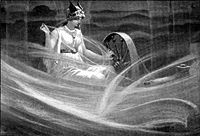
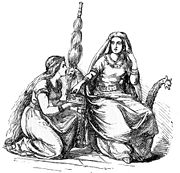
Norse paganism
Norse paganism is the religious traditions of the Norsemen, a Germanic people living in the Nordic countries. Norse paganism is therefore a subset of Germanic paganism, which was practiced in the lands inhabited by the Germanic tribes across most of Northern and Central Europe in the Viking Age...
, a subset of Germanic paganism
Germanic paganism
Germanic paganism refers to the theology and religious practices of the Germanic peoples of north-western Europe from the Iron Age until their Christianization during the Medieval period...
. She is said to be the wife of Odin
Odin
Odin is a major god in Norse mythology and the ruler of Asgard. Homologous with the Anglo-Saxon "Wōden" and the Old High German "Wotan", the name is descended from Proto-Germanic "*Wodanaz" or "*Wōđanaz"....
, and is the "foremost among the goddesses" and the queen of Asgard
Asgard
In Norse religion, Asgard is one of the Nine Worlds and is the country or capital city of the Norse Gods surrounded by an incomplete wall attributed to a Hrimthurs riding the stallion Svadilfari, according to Gylfaginning. Valhalla is located within Asgard...
. Frigg appears primarily in Norse mythological stories
Norse mythology
Norse mythology, a subset of Germanic mythology, is the overall term for the myths, legends and beliefs about supernatural beings of Norse pagans. It flourished prior to the Christianization of Scandinavia, during the Early Middle Ages, and passed into Nordic folklore, with some aspects surviving...
as a wife and a mother. She is also described as having the power of prophecy yet she does not reveal what she knows. Frigg is described as the only one other than Odin who is permitted to sit on his high seat Hlidskjalf
Hlidskjalf
In Norse mythology, Hliðskjálf is the high seat of Odin allowing him to see into all realms.-Poetic Edda:In Grímnismál, Odin and Frigg are both sitting in Hliðskjálf when they see their foster sons Agnarr and Geirröðr, one living in a cave with a giantess and the other a king...
and look out over the universe. The English term Friday
Friday
Friday is the day between Thursday and Saturday. In countries adopting Monday-first conventions as recommended by the international standard ISO 8601, it is the fifth day of the week. It is the sixth day in countries that adopt a Sunday-first convention as in Abrahamic tradition...
derives from the Anglo-Saxon name for Frigg, Frige.
Frigg is the mother of Baldr. Her stepchildren are Thor
Thor
In Norse mythology, Thor is a hammer-wielding god associated with thunder, lightning, storms, oak trees, strength, the protection of mankind, and also hallowing, healing, and fertility...
, Hermóðr
Hermóðr
Hermóðr the Brave is a figure in Norse mythology, the son of god Odin.-Prose Edda:Hermóðr appears distinctly in section 49 of the Prose Edda book Gylfaginning. There, it is described that the gods were speechless and devastated at the death of Baldr, unable to react due to their grief...
, Heimdallur, Týr, Bragi
Bragi
Bragi is the skaldic god of poetry in Norse mythology.-Etymology:Bragi is generally associated with bragr, the Norse word for poetry. The name of the god may have been derived from bragr, or the term bragr may have been formed to describe 'what Bragi does'...
, Víðarr, Váli
Váli (son of Odin)
In Norse mythology, Váli is a son of the god Odin and the giantess Rindr. He was birthed for the sole purpose of killing Höðr as revenge for Höðr's accidental murder of his half-brother, Baldr. He grew to full adulthood within one day of his birth, and slew Höðr...
, Skjöldur, and Höðr
Höðr
Höðr is the brother of Baldr in Norse mythology. Guided by Loki he shot the mistletoe missile which was to slay the otherwise invulnerable Baldr....
. Frigg's companion is Eir
Eir
In Norse mythology, Eir is a goddess and/or valkyrie associated with medical skill. Eir is attested in the Poetic Edda, compiled in the 13th century from earlier traditional sources; the Prose Edda, written in the 13th century by Snorri Sturluson; and in skaldic poetry, including a runic...
, a goddess associated with medical skills. Frigg's attendants are Hlín
Hlín
In Norse mythology, Hlín is a goddess associated with the goddess Frigg. Hlín appears in a poem in the Poetic Edda, compiled in the 13th century from earlier traditional sources, the Prose Edda, written in the 13th century by Snorri Sturluson, and in kennings found in skaldic poetry...
, Gná
Gná
In Norse mythology, Gná is a goddess who runs errands in other worlds for the goddess Frigg and rides the flying, sea-treading horse Hófvarpnir . Gná and Hófvarpnir are attested in the Prose Edda, written in the 13th century by Snorri Sturluson...
, and Fulla
Fulla
In Germanic mythology, Fulla or Volla is a goddess. In Norse mythology, Fulla is described as wearing a golden snood and as tending to the ashen box and the footwear owned by the goddess Frigg, and, in addition, Frigg confides in Fulla her secrets...
.
In the Poetic Edda
Poetic Edda
The Poetic Edda is a collection of Old Norse poems primarily preserved in the Icelandic mediaeval manuscript Codex Regius. Along with Snorri Sturluson's Prose Edda, the Poetic Edda is the most important extant source on Norse mythology and Germanic heroic legends, and from the early 19th century...
poem Lokasenna
Lokasenna
Lokasenna is one of the poems of the Poetic Edda. The poem presents flyting between the gods and Loki....
26, Frigg is said to be Fjörgyns mær ("Fjörgynn's maiden"). The problem is that in Old Norse mær means both "daughter" and "wife," so it is not fully clear if Fjörgynn is Frigg's father or another name for her husband Odin
Odin
Odin is a major god in Norse mythology and the ruler of Asgard. Homologous with the Anglo-Saxon "Wōden" and the Old High German "Wotan", the name is descended from Proto-Germanic "*Wodanaz" or "*Wōđanaz"....
, but Snorri Sturluson
Snorri Sturluson
Snorri Sturluson was an Icelandic historian, poet, and politician. He was twice elected lawspeaker at the Icelandic parliament, the Althing...
interprets the line as meaning Frigg is Fjörgynn's daughter (Skáldskaparmál
Skáldskaparmál
The second part of Snorri Sturluson's Prose Edda the Skáldskaparmál or "language of poetry" is effectively a dialogue between the Norse god of the sea, Ægir and Bragi, the god of poetry, in which both Norse mythology and discourse on the nature of poetry are intertwined...
27), and most modern translators of the Poetic Edda follow Snorri. The original meaning of fjörgynn was the earth, cf. feminine version Fjorgyn, a byname for Jörð, the earth. The other piece of evidence lies with the goddess Fjorgyn, who is the mother of Thor, and whose name can be translated into Earth. Since Fjorgyn is not only the name of a goddess, but the feminine byname for Earth, it is relatively safe to assume that "mær", in this case, means "daughter".
Etymology
Old Norse Frigg (genitive Friggjar), Old SaxonOld Saxon
Old Saxon, also known as Old Low German, is the earliest recorded form of Low German, documented from the 8th century until the 12th century, when it evolved into Middle Low German. It was spoken on the north-west coast of Germany and in the Netherlands by Saxon peoples...
Fri, and Old English
Old English language
Old English or Anglo-Saxon is an early form of the English language that was spoken and written by the Anglo-Saxons and their descendants in parts of what are now England and southeastern Scotland between at least the mid-5th century and the mid-12th century...
Frig are derived from Common Germanic Frijjō. Frigg is cognate with Sanskrit
Sanskrit
Sanskrit , is a historical Indo-Aryan language and the primary liturgical language of Hinduism, Jainism and Buddhism.Buddhism: besides Pali, see Buddhist Hybrid Sanskrit Today, it is listed as one of the 22 scheduled languages of India and is an official language of the state of Uttarakhand...
prīyā́ which means "wife." The root also appears in Old Saxon fri which means "beloved lady", in Swedish as fria ("to propose for marriage") and in Icelandic as frjá which means "to love."
Attributes
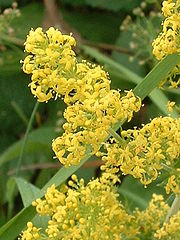
Asterism (astronomy)
In astronomy, an asterism is a pattern of stars recognized on Earth's night sky. It may form part of an official constellation, or be composed of stars from more than one. Like constellations, asterisms are in most cases composed of stars which, while they are visible in the same general direction,...
Orion's Belt
Orion (constellation)
Orion, often referred to as The Hunter, is a prominent constellation located on the celestial equator and visible throughout the world. It is one of the most conspicuous, and most recognizable constellations in the night sky...
was known as "Frigg's Distaff
Distaff
As a noun, a distaff is a tool used in spinning. It is designed to hold the unspun fibers, keeping them untangled and thus easing the spinning process. It is most commonly used to hold flax, and sometimes wool, but can be used for any type of fiber. Fiber is wrapped around the distaff, and tied in...
/spinning wheel
Spindle (textiles)
A spindle is a wooden spike used for spinning wool, flax, hemp, cotton, and other fibres into thread. It is commonly weighted at either the bottom middle or top, most commonly by a circular or spherical object called a whorl, and may also have a hook, groove or notch, though spindles without...
" (Friggerock) or "Freyja's Distaff" (Frejerock). Some have pointed out that the constellation is on the celestial equator and have suggested that the stars rotating in the night sky may have been associated with Frigg's spinning wheel. The Norse name for the planet Venus
Venus
Venus is the second planet from the Sun, orbiting it every 224.7 Earth days. The planet is named after Venus, the Roman goddess of love and beauty. After the Moon, it is the brightest natural object in the night sky, reaching an apparent magnitude of −4.6, bright enough to cast shadows...
was Friggjarstjarna 'Frigg's star'.
Frigg's name means "love" or "beloved one" (Proto-Germanic *frijjō, cf. Sanskrit
Sanskrit
Sanskrit , is a historical Indo-Aryan language and the primary liturgical language of Hinduism, Jainism and Buddhism.Buddhism: besides Pali, see Buddhist Hybrid Sanskrit Today, it is listed as one of the 22 scheduled languages of India and is an official language of the state of Uttarakhand...
priyā "beloved") and was known among many northern European cultures with slight name variations over time: e.g. Friggja in Sweden, Frīg (genitive Frīge
Frige
*Frijjō is the reconstructed name or epithet of a hypothesized Common Germanic love goddess giving rise to both Frigg and Freyja....
) in Old English, and Fricka
Fricka
Frička is a village and municipality in Bardejov District in the Prešov Region of north-east Slovakia.-Geography:The municipality lies at an altitude of 500 metres and covers an area of 8.279km².It has a population of about 255 people.-External links:...
in Richard Wagner
Richard Wagner
Wilhelm Richard Wagner was a German composer, conductor, theatre director, philosopher, music theorist, poet, essayist and writer primarily known for his operas...
's operatic cycle Der Ring des Nibelungen
Der Ring des Nibelungen
Der Ring des Nibelungen is a cycle of four epic operas by the German composer Richard Wagner . The works are based loosely on characters from the Norse sagas and the Nibelungenlied...
. Modern English translations have sometimes altered Frigg to Frigga. It has been suggested that "Frau Holle
Holda
In Germanic folklore as established by Jacob Grimm, Frau Holda or Holle is the supernatural matron of spinning, childbirth and domestic animals, and is also associated with winter, witches and the Wild Hunt...
" of German folklore
German folklore
German folklore shares many characteristics with Scandinavian folklore and English folklore due to their origins in a common Germanic mythology. It reflects a similar mix of influences: a pre-Christian pantheon and other beings equivalent to those of Norse mythology; magical characters associated...
is a survival of Frigg.
Frigg's hall in Asgard is Fensalir
Fensalir
In Norse mythology, Fensalir is a location where the goddess Frigg dwells. Fensalir is attested in the Poetic Edda, compiled in the 13th century from earlier traditional sources, and the Prose Edda, written in the 13th century by Snorri Sturluson...
, which means "Marsh Halls." This may mean that marshy or boggy land was considered especially sacred to her but nothing definitive is known. The goddess Saga, who was described as drinking with Odin from golden cups in her hall "Sunken Benches," may be Frigg by a different name.
Frigg was a goddess associated with married women. She was called up by women to assist in giving birth to children, and Scandinavians used the plant Lady's Bedstraw (Galium verum) as a sedative, they called it Frigg's grass).
See also Friday
Friday
Friday is the day between Thursday and Saturday. In countries adopting Monday-first conventions as recommended by the international standard ISO 8601, it is the fifth day of the week. It is the sixth day in countries that adopt a Sunday-first convention as in Abrahamic tradition...
.
Death of Baldr
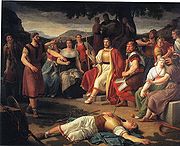
Prose Edda
The Prose Edda, also known as the Younger Edda, Snorri's Edda or simply Edda, is an Icelandic collection of four sections interspersed with excerpts from earlier skaldic and Eddic poetry containing tales from Nordic mythology...
book Gylfaginning
Gylfaginning
Gylfaginning, or the Tricking of Gylfi , is the first part of Snorri Sturluson's Prose Edda after Prologue. The Gylfaginning deals with the creation and destruction of the world of the Norse gods, and many other aspects of Norse mythology...
written by Snorri Sturluson
Snorri Sturluson
Snorri Sturluson was an Icelandic historian, poet, and politician. He was twice elected lawspeaker at the Icelandic parliament, the Althing...
, where a version of a story relating the death of Baldr is recorded by Snorri. Baldr has had a series of ominous dreams. As Baldr was popular amongst the Æsir
Æsir
In Old Norse, áss is the term denoting a member of the principal pantheon in Norse paganism. This pantheon includes Odin, Frigg, Thor, Baldr and Tyr. The second pantheon comprises the Vanir...
, after Baldr told the Æsir about his dreams, they met together at the thing
Thing (assembly)
A thing was the governing assembly in Germanic and introduced into some Celtic societies, made up of the free people of the community and presided by lawspeakers, meeting in a place called a thingstead...
and decided it wise to provide a truce for Baldr that would maintain his safety. Frigg, his mother, here takes an oath from all things, which includes disease, poisons, the elements, objects and all living beings that none will harm Baldr.
After the oaths were taken, the Æsir, aware of Baldr's newly gained invincibility, had Baldr stand in front of the thing. There, the Æsir hit Baldr with blows, shot objects at him, and some would hit him with stones. Nothing harmed him and everyone felt it was remarkable.
Loki
Loki
In Norse mythology, Loki or Loke is a god or jötunn . Loki is the son of Fárbauti and Laufey, and the brother of Helblindi and Býleistr. By the jötunn Angrboða, Loki is the father of Hel, the wolf Fenrir, and the world serpent Jörmungandr. By his wife Sigyn, Loki is the father of Nari or Narfi...
witnessed this and was angered by Baldr's invulnerability. Loki changed himself into a woman and visited Frigg at her hall Fensalir. There, Frigg asked the woman if she knew what was happening at the thing. The woman told her that the Æsir were shooting at Baldr and yet he remained unharmed. Frigg responded that nothing could harm Baldr, as she had taken oaths from all things.
The woman asked Frigg if all things had indeed promised not to hurt Baldr, to which Frigg reveals that:
"A shoot of wood grows west of ValhallaValhallaIn Norse mythology, Valhalla is a majestic, enormous hall located in Asgard, ruled over by the god Odin. Chosen by Odin, half of those that die in combat travel to Valhalla upon death, led by valkyries, while the other half go to the goddess Freyja's field Fólkvangr...
. It is called mistletoeMistletoeMistletoe is the common name for obligate hemi-parasitic plants in several families in the order Santalales. The plants in question grow attached to and within the branches of a tree or shrub.-Mistletoe in the genus Viscum:...
, and it seemed too young for me to demand its oath."
Immediately after Frigg revealed this, the woman vanished. Loki then took hold of the mistletoe, broke it off and went to the thing.
There, Höðr, since he was blind, stood at the edge of the circle of people. Loki offered to help Höðr in honoring Baldr by shooting things at him. Höðr took the mistletoe from Loki and, following Loki's directions, shot at Baldr. The mistletoe went directly through Baldr and he fell to the ground. Baldr was dead.
The gods were speechless and devastated, unable to react due to their grief. After the gods gathered their wits from the immense shock and grief of Baldr's death, Frigg asked the Æsir who amongst them wished "to gain all of her love and favor" by riding the road to Hel. Whoever agreed was to offer Hel
Hel (being)
In Norse mythology, Hel is a being who presides over a realm of the same name, where she receives a portion of the dead. Hel is attested in the Poetic Edda, compiled in the 13th century from earlier traditional sources, and the Prose Edda, written in the 13th century by Snorri Sturluson...
a ransom in exchange for Baldr's return to Asgard. Hermóðr agrees to this and set off with Sleipnir
Sleipnir
In Norse mythology, Sleipnir is an eight-legged horse. Sleipnir is attested in the Poetic Edda, compiled in the 13th century from earlier traditional sources, and the Prose Edda, written in the 13th century by Snorri Sturluson...
to Hel.
While Hermóðr rides to Hel, Frigg arrives at the cremation with Odin, Hugin and Munin
Hugin and Munin
In Norse mythology, Huginn and Muninn are a pair of ravens that fly all over the world, Midgard, and bring the god Odin information...
, and the Valkyries. With them came various other gods and beings during which a grand funeral for Baldr was held. After a long journey, Hermóðr arrives in Hel, meets with Hel and pleads for the return of Baldr on behalf of Frigg. Hel gives the condition that all things must weep for Baldr if Baldr will be returned to Asgard. Nanna, the wife of Baldr (whose heart burst upon seeing the corpse of Baldr and was placed upon the pyre with Baldr), gives gifts to Hermóðr to return to Asgard with. "Along with other gifts," only two gifts are specifically mentioned: a white linen robe for Frigg and a golden ring for Fulla
Fulla
In Germanic mythology, Fulla or Volla is a goddess. In Norse mythology, Fulla is described as wearing a golden snood and as tending to the ashen box and the footwear owned by the goddess Frigg, and, in addition, Frigg confides in Fulla her secrets...
.
The Æsir then sent forth messengers to all things to have them weep for Baldr, so that he may return from Hel. All things did but a giantess by the name of Þökk, regarding whom Snorri writes that "people believe that the giantess was Loki." Afterwards, in sections 50 and 51, a series of events occur where the gods take revenge upon Loki by binding him and thus furthering the onset of Ragnarök
Ragnarök
In Norse mythology, Ragnarök is a series of future events, including a great battle foretold to ultimately result in the death of a number of major figures , the occurrence of various natural disasters, and the subsequent submersion of the world in water...
, though Frigg is not mentioned further
Vili and Ve
_from_die_helden_und_gtter_des_nordens,_oder_das_buch_der_sagen.jpg)
VE
VE, Ve or ve may refer to:* Vili and Vé, gods in Norse mythology* Vé , a shrine in Germanic paganism and modern place name element* Ve , a character from the Cyrillic alphabet* Ve , a character of the Arabic alphabet...
, has survived in very brief form. In the Ynglinga Saga
Ynglinga saga
Ynglinga saga is a legendary saga, originally written in Old Norse by the Icelandic poet Snorri Sturluson about 1225. It was first translated into English and published in 1844....
of Snorri Sturluson
Snorri Sturluson
Snorri Sturluson was an Icelandic historian, poet, and politician. He was twice elected lawspeaker at the Icelandic parliament, the Althing...
the entire story is told as follows:
"Othin [Odin] had two brothers. One was called VeVEVE, Ve or ve may refer to:* Vili and Vé, gods in Norse mythology* Vé , a shrine in Germanic paganism and modern place name element* Ve , a character from the Cyrillic alphabet* Ve , a character of the Arabic alphabet...
, and the other Vili. These, his brothers, governed the realm when he was gone. One time when Othin was gone to a great distance, he stayed away so long that the Æsir thought he would never return. Then his brothers began to divide his inheritance; but his wife Frigg they shared between them. However, a short while afterwards, Othin returned and took possession of his wife again."
The same story is referenced in one stanza of the poem, Lokasenna
Lokasenna
Lokasenna is one of the poems of the Poetic Edda. The poem presents flyting between the gods and Loki....
, in which Loki insults Frigg by accusing her of infidelity with Odin's brothers:
Hush thee, Frigg, who art Fjorgyn's daughter:
Thou hast ever been mad after men.
Vili and Ve, thou, Vithrir's spouse, [Vithrir=Odin]
Didst fold to thy bosom both.
Modern scholars such as Lee Hollander explain that Lokasenna was intended to be humorous and that the accusations thrown by Loki in the poem are not necessarily to be taken as "generally accepted lore" at the time it was composed. Rather they are charges that are easy for Loki to make and difficult for his targets to disprove, or which they do not care to refute.
Comparisons have been proposed regarding Frigg's role in this story to that of sacred queens during certain periods in ancient Egypt, when a king was king by virtue of being the queen's husband.
Historia Langobardorum
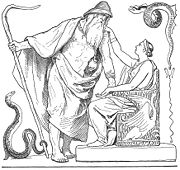
Paul the Deacon
Paul the Deacon , also known as Paulus Diaconus, Warnefred, Barnefridus and Cassinensis, , was a Benedictine monk and historian of the Lombards.-Life:...
, who died in southern Italy in the 790s, was proud of his tribal origins and related how his people once had migrated from southern Scandinavia. In his work Historia Langobardorum, Paul relates how Odin's wife Frea (Frigg/Freyja) had given victory to the Langobards in a war against the Vandals
Vandals
The Vandals were an East Germanic tribe that entered the late Roman Empire during the 5th century. The Vandals under king Genseric entered Africa in 429 and by 439 established a kingdom which included the Roman Africa province, besides the islands of Sicily, Corsica, Sardinia and the Balearics....
. She is depicted as a wife who knows how to get her own way even though her husband thinks he is in charge. The Winnili and the Vandals
Vandals
The Vandals were an East Germanic tribe that entered the late Roman Empire during the 5th century. The Vandals under king Genseric entered Africa in 429 and by 439 established a kingdom which included the Roman Africa province, besides the islands of Sicily, Corsica, Sardinia and the Balearics....
were two warring tribes. Odin favored the Vandals, while Frea favored the Winnili. After a heated discussion, Odin swore that he would grant victory to the first tribe he saw the next morning upon awakening—knowing full well that the bed was arranged so that the Vandals were on his side. While he slept, Frea told the Winnili women to comb their hair over their faces to look like long beards so they would look like men and turned the bed so the Winnili women would be on Odin's side. When he woke up, Odin was surprised to see the disguised women first and asked who these long bearded men were, which was where the tribe got its new name, the Langobards ("longbeards"). Odin kept his oath and granted victory to the Winnili (now known as the Lombards
Lombards
The Lombards , also referred to as Longobards, were a Germanic tribe of Scandinavian origin, who from 568 to 774 ruled a Kingdom in Italy...
), and eventually saw the wisdom of Frea's choice.
Gesta Danorum
Saxo GrammaticusSaxo Grammaticus
Saxo Grammaticus also known as Saxo cognomine Longus was a Danish historian, thought to have been a secular clerk or secretary to Absalon, Archbishop of Lund, foremost advisor to Valdemar I of Denmark. He is the author of the first full history of Denmark.- Life :The Jutland Chronicle gives...
wrote in his Gesta Danorum
Gesta Danorum
Gesta Danorum is a patriotic work of Danish history, by the 12th century author Saxo Grammaticus . It is the most ambitious literary undertaking of medieval Denmark and is an essential source for the nation's early history...
another story about Frigg:
"At this time there was one Odin, who was credited over all Europe with the honour, which was false, of godhead, but used more continually to sojourn at UpsalaGamla UppsalaGamla Uppsala is a parish and a village outside Uppsala in Sweden. It had 16,231 inhabitants in 1991.As early as the 3rd century AD and the 4th century AD and onwards, it was an important religious, economic and political centre...
; and in this spot, either from the sloth of the inhabitants or from its own pleasantness, he vouchsafed to dwell with somewhat especial constancy.
The kings of the North, desiring more zealously to worship his deity, embounded his likeness in a golden image; and this statue, which betokened their homage, they transmitted with much show of worship to Byzantium, fettering even the effigied arms with a serried mass of bracelets. Odin was overjoyed at such notoriety, and greeted warmly the devotion of the senders. But his queen Frigg, desiring to go forth more beautified, called smiths, and had the gold stripped from the statue.
Odin hanged them, and mounted the statue upon a pedestal, which by the marvellous skill of his art he made to speak when a mortal touched it. But still Frigg preferred the splendour of her own apparel to the divine honours of her husband, and submitted herself to the embraces of one of her servants; and it was by this man's device she broke down the image, and turned to the service of her private wantonness that gold which had been devoted to public idolatry. Little thought she of practicing unchastity, that she might the easier satisfy her greed, this woman so unworthy to be the consort of a god; but what should I here add, save that such a godhead was worthy of such a wife? So great was the error that of old befooled the minds of men.
Thus Odin, wounded by the double trespass of his wife, resented the outrage to his image as keenly as that to his bed; and, ruffled by these two stinging dishonours, took to an exile overflowing with noble shame, imagining so to wipe off the slur of his ignominy. At home, Frigg went with a certain Mith-Othin and took over Odin's properties, until Odin came back and drove them away. Frigg's death later cleared Odin's name and he regained his reputation." (Gesta DanorumGesta DanorumGesta Danorum is a patriotic work of Danish history, by the 12th century author Saxo Grammaticus . It is the most ambitious literary undertaking of medieval Denmark and is an essential source for the nation's early history...
, Book I)
In Saxo's Gesta Danorum, however, the gods and goddesses are heavily euhemerized, and Saxo's view on pagan deities is extremely biased, therefore most stories related to pagan gods written in it might not exist in ancient lore. Georges Dumézil
Georges Dumézil
Georges Dumézil was a French comparative philologist best known for his analysis of sovereignty and power in Proto-Indo-European religion and society...
linked Saxo's account of Frigg's infidelity and the stolen gold with the burning of Gullveig
Gullveig
In Norse mythology, Gullveig is a being who was speared by the Æsir, burnt three times, and yet thrice reborn. Upon her third rebirth, Gullveig's name becomes Heiðr and she is described as a knowledgeable and skillful völva. Gullveig/Heiðr is solely attested in the Poetic Edda, compiled in the 13th...
.
Connection between Frigg and Freyja
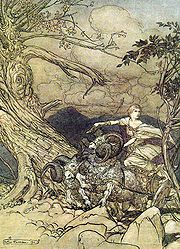
Æsir
In Old Norse, áss is the term denoting a member of the principal pantheon in Norse paganism. This pantheon includes Odin, Frigg, Thor, Baldr and Tyr. The second pantheon comprises the Vanir...
, while Freyja is the highest goddess of the Vanir
Vanir
In Norse mythology, the Vanir are a group of gods associated with fertility, wisdom and the ability to see the future. The Vanir are one of two groups of gods and are the namesake of the location Vanaheimr . After the Æsir–Vanir War, the Vanir became a subgroup of the Æsir...
. Many arguments have been made both for and against the idea that Frigg and Freyja are really the same goddess, avatars of one another.
Some arguments are based on linguistic analysis, others on the fact that Freyja was not known in southern Germany, only in the north, and in some places the two goddesses were considered to be the same, while in others they were considered to be different. There are clearly many similarities between the two: both had flying cloaks of falcon feathers and engaged in shape-shifting, Frigg was married to Odin while Freyja was married to Óðr
Óðr
In Norse mythology, Óðr or Óð, sometimes angliziced as Odr or Od, is a figure associated with the major goddess Freyja...
, both had special necklaces, both had a personification of the Earth as a parent, both were called upon for assistance in childbirth, etc.
There is also an argument that Frigg and Freyja are part of a triad of goddesses (together with a third goddess such as Hnoss
Hnoss
In Norse mythology, Hnoss is the daughter of Freyja and Óðr, and sister of Gersemi.-References:* Orchard, Andy . Dictionary of Norse Myth and Legend. Cassell. ISBN 0-304-34520-2...
or Iðunn
Iðunn
In Norse mythology, Iðunn is a goddess associated with apples and youth. Iðunn is attested in the Poetic Edda, compiled in the 13th century from earlier traditional sources, and the Prose Edda, written in the 13th century by Snorri Sturluson...
) associated with the different ages of womankind. The areas of influence of Frigg and Freyja do not quite match up with the areas of influence often seen in other goddess triads. This may mean that the argument is not a good one, or it may show something interesting about northern European culture as compared to Celtic and southern European culture.
Finally, there is an argument that Frigg and Freyja are similar goddesses from different pantheons who were first conflated into each other and then later seen as separate goddesses again (see also Frige
Frige
*Frijjō is the reconstructed name or epithet of a hypothesized Common Germanic love goddess giving rise to both Frigg and Freyja....
). This is consistent with the theological treatment of some Greek, Roman, and Egyptian deities in the late classical period.
Toponyms
In VästergötlandVästergötland
', English exonym: West Gothland, is one of the 25 traditional non-administrative provinces of Sweden , situated in the southwest of Sweden. In older English literature one may also encounter the Latinized version Westrogothia....
, Sweden
Sweden
Sweden , officially the Kingdom of Sweden , is a Nordic country on the Scandinavian Peninsula in Northern Europe. Sweden borders with Norway and Finland and is connected to Denmark by a bridge-tunnel across the Öresund....
, there is a place called Friggeråker. An English charter from 936 AD displays the name Frigedune, which means "Valley of Frig," thus implying that Friden
Friden, Derbyshire
Friden is a hamlet in the civil parish of Hartington Nether Quarter, Derbyshire, England. It is located 11 miles south-east of Buxton just off the Newhaven to Cromford Via Gellia road and lies within the Peak District National Park....
in Derbyshire
Derbyshire
Derbyshire is a county in the East Midlands of England. A substantial portion of the Peak District National Park lies within Derbyshire. The northern part of Derbyshire overlaps with the Pennines, a famous chain of hills and mountains. The county contains within its boundary of approx...
is named after Frigg. The villages of Froyle
Froyle
Froyle, or to be more accurate, Upper and Lower Froyle, is a village and civil parish in the East Hampshire district of Hampshire, England...
("Frigg's Hill") and Freefolk
Freefolk
Freefolk is a village in Hampshire, England. It lies to the west and almost directly alongside the village of Laverstoke; the two villages are separated by the River Test....
("Frigg's People") in Hampshire
Hampshire
Hampshire is a county on the southern coast of England in the United Kingdom. The county town of Hampshire is Winchester, a historic cathedral city that was once the capital of England. Hampshire is notable for housing the original birthplaces of the Royal Navy, British Army, and Royal Air Force...
, England may also be named after Frigg.

